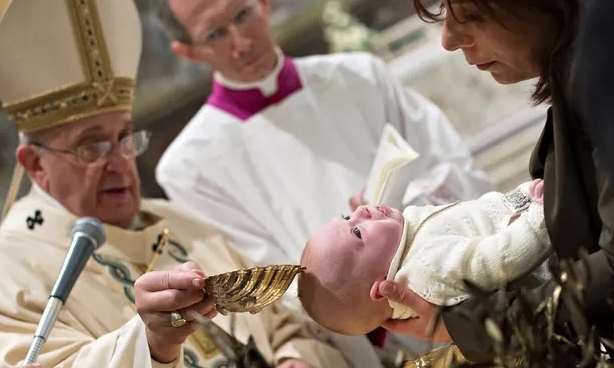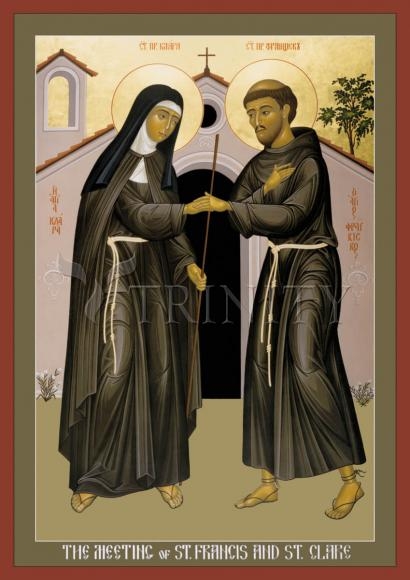These reflections are a result of more than 40 years of ministry as a Roman Catholic priest. Most of these years I spent in the Diocese of Charlotte which covers Western North Carolina. Now I am retired, and live in Medellín, Colombia where I continue to serve as a priest in the Archdiocese of Medellín.

Children were brought to Jesus that he might lay his hands on them and pray. The disciples rebuked them, but Jesus said, "Let the children come to me, and do not prevent them; for the Kingdom of heaven belongs to such as these." After he placed his hands on them, he went away. (Mt 19:13-15)
https://bible.usccb.org/bible/readings/081322.cfm
Jesus and the children is an image we all can relate too, especially parents with crying babies. The disciples were saying, “No crying babies near Jesus!” Jesus, on the other hand, just scooped the children up in his arms and then reminded his disciples about the priorities of the Kingdom. Today’s picture is of Pope Francis who baptized 33 babies in the Sistine Chapel. He told the mothers that if their baby cried that it was okay to go ahead and breastfeed them. Some cardinals were not amused.

Then I bathed you with water, washed away your blood, and anointed you with oil. I clothed you with an embroidered gown, put sandals of fine leather on your feet; I gave you a fine linen sash and silk robes to wear. I adorned you with jewelry: I put bracelets on your arms, a necklace about your neck, a ring in your nose, pendants in your ears, and a glorious diadem upon your head. Thus you were adorned with gold and silver; your garments were of fine linen, silk, and embroidered cloth. Fine flour, honey, and oil were your food. You were exceedingly beautiful, with the dignity of a queen. But you were captivated by your own beauty, you used your renown to make yourself a harlot, and you lavished your harlotry on every passer-by,
whose own you became. Yet I will remember the covenant I made with you when you were a girl, and I will set up an everlasting covenant with you. (Ez 16:1-15. 60, 63)
https://bible.usccb.org/bible/readings/081222.cfm
What a powerful description of God’s undying love for us!

You shall bring out your baggage like an exile in the daytime while they are looking on; in the evening, again while they are looking on, you shall go out like one of those driven into exile; while they look on, dig a hole in the wall and pass through it; while they look on, shoulder the burden and set out in the darkness; cover your face that you may not see the land, for I have made you a sign for the house of Israel. I did as I was told. (Ez 12:1-12)
https://bible.usccb.org/bible/readings/081122.cfm
Prophetic, symbolic acts are an essential part of the ministry of the Prophet Ezekiel, especially for those who “have eyes to see but do not see, and ears to hear but do not hear.” Saint Clare heard the preaching of Saint Francis of Assisi and gave her life to God embracing poverty and humility.

Responsorial Psalm (Psalm 112)
R. Blessed the man who is gracious and lends to those in need.
Blessed the man who fears the LORD,
who greatly delights in his commands.
His posterity shall be mighty upon the earth;
the upright generation shall be blessed.
R. Blessed the man who is gracious and lends to those in need.
https://bible.usccb.org/bible/readings/081022.cfm
Saint Lawrence is the model for all deacons. His dedication to the poor is still sung in the church and reminds us all that ministry is defined by service, even to the point of laying down our lives.

He said to me: Son of man, eat what is before you; eat this scroll, then go, speak to the house of Israel. So I opened my mouth and he gave me the scroll to eat. Son of man, he then said to me, feed your belly and fill your stomach with this scroll I am giving you. I ate it, and it was as sweet as honey in my mouth. He said: Son of man, go now to the house of Israel, and speak my words to them. (Ez 2:8-3:4)
https://bible.usccb.org/bible/readings/080922.cfm
Literally eating the words of the Lord, the prophet Ezekiel communicates the Word to us. As the Psalmist says: “How sweet to my taste is your promise!”



